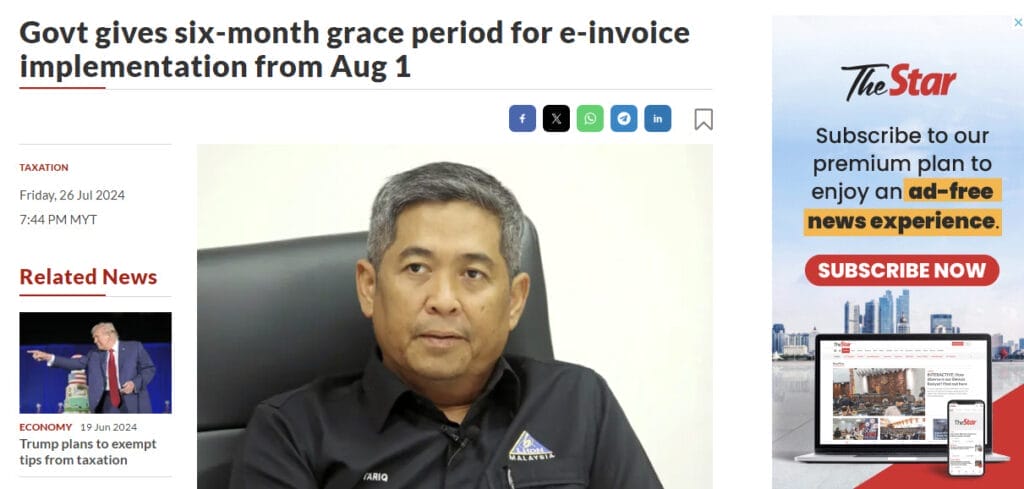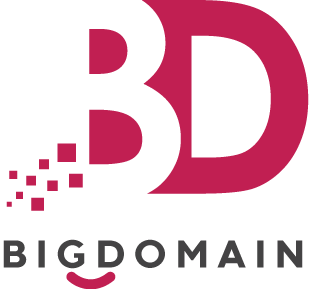The digital transformation of Malaysia’s tax system is set to take a significant leap forward with the introduction of e-invoicing. The Inland Revenue Board of Malaysia (IRBM) has outlined a phased implementation plan to ensure a smooth transition for businesses across the country.
This comprehensive guide provides an overview of the latest updates, key deadlines, and practical information to help businesses prepare for this new era of digital invoicing.
Aug 2024: Expansion of LHDN’s E-Invoicing Initiative to Sabah: Boosting Digital Integration for SMEs
The Inland Revenue Board (LHDN) has recently expanded its e-invoicing implementation to Sabah as part of a broader initiative to enhance the government’s national digitisation agenda.
This move is aimed at integrating more businesses into the digital tax system, focusing on small and medium-sized enterprises (SMEs) in Sabah. The LHDN has emphasized its commitment to providing technical support and guidance to ensure a smooth transition for businesses in the region.
To facilitate this implementation, LHDN held an e-invoice seminar in Kota Kinabalu, attended by around 1,500 participants, including tax practitioners, professional bodies, and entrepreneurs. This seminar, organized in collaboration with local business associations such as the Kota Kinabalu Chinese Chambers of Commerce and Industry (KKCCCI), aimed to foster two-way communication between LHDN and industry players, ensuring that feedback and suggestions could be incorporated to improve the service quality of the e-invoicing system (The Star) (Bursa Malaysia (KLSE) Market Summary).
Key Deadlines and Phased e-invoicing Implementation

The rollout of e-invoicing Malaysia will occur in three distinct phases based on the annual revenue of businesses:
- August 1, 2024: Businesses with an annual revenue exceeding MYR 100 million in the financial year 2022 must begin issuing e-invoices. This marks the start of the mandatory e-invoicing phase for large corporations.
- January 1, 2025: The requirement extends to businesses with an annual revenue between MYR 25 million and MYR 100 million.
- July 1, 2025: All remaining businesses, including SMEs and micro enterprises, will be required to comply with e-invoicing regulations.
This phased approach ensures that businesses have adequate time to adapt to the new system, mitigating potential disruptions and challenges.
e-invoicing Six-Month Grace Period and Flexibility

To facilitate a smooth transition, the IRBM has announced a six-month grace period starting from the date of mandatory implementation. During this period, businesses can issue consolidated e-invoices without the risk of penalties. This flexibility allows companies to become accustomed to the system and address any operational challenges. Additionally, businesses are permitted to enter any transaction description in the “Product or Service Description” field, providing further ease during the adaptation phase (Malay Mail).
e-invoicing Exemptions and Tax Incentives
Micro SMEs with annual earnings below RM150,000 are exempt from the mandatory e-invoicing requirement. Moreover, the Malaysian government offers tax incentives for businesses that either develop their own e-invoicing systems or utilize third-party solutions. These incentives include a reduction in the capital allowance claim period and a tax break of up to RM50,000 for consultation fees from 2024 to 2027. This initiative aims to reduce the financial burden on businesses during the transition (The Star).
e-invoicing Penalties in Malaysia
The latest updates on e-invoicing penalties in Malaysia highlight the consequences for non-compliance with the new regulations set to take effect in phases starting August 1, 2024. The penalties can include fines ranging from RM200 to RM20,000 or imprisonment for up to six months, or both, depending on the severity of the non-compliance.
However, to assist businesses during the transition, the Malaysian Inland Revenue Board (IRBM) has introduced a six-month grace period starting from August 1, 2024. During this period, companies can issue consolidated e-invoices without facing penalties. This grace period aims to give businesses time to adjust to the new system and ensure full compliance.
It’s important for businesses to start familiarizing themselves with the e-invoicing system and utilize the MyInvois Sandbox environment for practice. This preparation will help avoid any potential issues and penalties once the mandatory e-invoicing requirements come into full effect. For further guidance and updates, businesses should refer to the latest guidelines issued by the IRBM and consult with tax professionals as needed.
The MyInvois Portal: How It Works
Malaysia’s centralized e-invoicing platform, MyInvois Portal, is designed to streamline the invoicing process. Businesses can interact with the system in two main ways:
- API Integration: Large businesses can integrate their ERP or other business systems with MyInvois through an API, allowing for automated submission and validation of e-invoices.
- Manual Entry: Smaller businesses can manually enter invoice data into the MyInvois portal. This method is suitable for companies with fewer transactions or limited IT infrastructure.
Upon submission, the MyInvois system validates the e-invoice, assigns a unique identifier, and generates a QR code for consumer transactions. The e-invoicing system also allows buyers to reject invoices within 72 hours if necessary.
Practical Tips for Businesses
- Prepare Early: Businesses are encouraged to familiarize themselves with the MyInvois system and the e-invoicing process well before their respective deadlines.
- Seek Professional Guidance: Companies, especially those developing their own systems, should consider consulting with tax professionals to ensure compliance and take advantage of available incentives.
- Educate and Train Staff: Ensuring that relevant employees understand the e-invoicing system and its requirements is crucial for a smooth transition.
Introducing MyInvois Portal Testing Environment
The MyInvois Portal Testing Environment, also known as the Sandbox, is now available for Malaysian businesses to practice e-invoicing processes before the full implementation. This environment allows companies to test their systems, ensuring compatibility with the MyInvois system via API integration or manual entry.
Key Features of the MyInvois Sandbox
- Profile Management: Users can manage profiles for various entities such as taxpayers, representatives, ERP systems, and intermediaries.
- Document Management: The portal supports submitting, viewing, rejecting, canceling, and printing documents, providing a comprehensive environment for testing e-invoicing functionalities.
How to Access the Sandbox
To access the Sandbox, businesses need to apply for a Client ID and Client Secret key from the Inland Revenue Board of Malaysia (IRBM). This requires providing details such as the Tax Identification Number (TIN), business registration number, company name, company email, and ERP system used. Once registered, businesses can conduct integration tests to ensure smooth operation when the MyInvois system goes live.
Why Use MyInvois Sandbox for SMEs
The latest KPMG survey on e-invoicing preparation in Malaysia reveals key insights into the readiness of businesses for the upcoming implementation. As of mid-2024, a significant portion of businesses are actively preparing for the mandatory e-invoicing requirements, with larger companies generally more advanced in their preparations compared to smaller businesses. The survey highlights that companies with annual revenues exceeding MYR 100 million are expected to implement e-invoicing by August 1, 2024, while those with revenues between MYR 25 million and MYR 100 million will follow by January 1, 2025. All other businesses, including SMEs, are expected to comply by July 1, 2025.
Key findings from the survey indicate that many businesses are still in the early stages of preparation, particularly smaller firms. The challenges include system integration, understanding new regulatory requirements, and training staff. KPMG advises businesses to begin their preparations as early as possible to avoid any last-minute rush and to ensure smooth compliance with the new system.
To assist with the transition, KPMG and other experts recommend leveraging the MyInvois Sandbox testing environment, which allows businesses to practice and fine-tune their systems before the actual implementation. This environment provides a risk-free space for companies to test their e-invoicing processes and make necessary adjustments.
Overall, while the transition to e-invoicing presents challenges, it is also seen as a significant step towards modernizing Malaysia’s tax administration and enhancing compliance.
Recommendations for SMEs in Malaysia
For SMEs, it’s recommended to start familiarizing themselves with the MyInvois system as early as possible. This includes understanding the functionalities available in the Sandbox, practicing the creation and submission of e-invoices, and ensuring that all relevant staff are trained. By doing so, businesses can avoid potential disruptions and ensure compliance when the e-invoicing requirements become mandatory.
Businesses can also refer to the User Guide provided by IRBM for detailed instructions on using the MyInvois Portal. Additionally, the data submitted in the testing environment will not be transferred to the production environment, so companies can freely experiment and learn without impacting their actual operations.
For further information and guidance, businesses can contact IRBM via their hotline or email.
Final Thoughts
The introduction of e-invoicing Malaysia marks a significant advancement in the nation’s tax administration. With the phased implementation, grace period, and available incentives, businesses have the resources and time to adapt. By embracing this digital transformation, companies can streamline their invoicing processes, improve accuracy, and contribute to a more efficient tax system.
For more detailed information and updates, refer to the official guidelines and FAQs provided by the IRBM and other reputable sources. This comprehensive guide aims to equip businesses with the knowledge and tools needed to navigate the new e-invoicing landscape successfully.
Best SME Partner for Malaysia SEO Success
BigDomain, the best SEO company in Malaysia that covers businesses more than just SEO marketing.
If you’re looking to optimize your small website for SEO marketing Malaysia, partnering with an expert can make a significant difference. BigDomain offers specialized SEO services Malaysia provided by the best SEO engineer team and tailored to your needs, ensuring that your website ranks well, even with fewer pages.
How BigDomain Can Help:
- Customized SEO Marketing Malaysia Strategies: BigDomain will create a tailored Malaysia SEO strategy that fits your business goals and content strategy, focusing on high-quality content and effective keyword targeting for Malaysia SEO.
- Expert On-Page SEO Services Malaysia: Our SEO engineer team will optimize your pages with the best practices in on-page SEO, including keyword optimization, meta tags, and internal linking.
- Improved User Experience: We ensure your website is fast, mobile-friendly, and easy to navigate, providing a seamless experience for your users.
- Content Creation: BigDomain provides you with fresh and relevant content tailored to enhance your site’s Malaysia SEO performance, delivered by our expert SEO engineer team.
Visit BigDomain to get your free SEO audit and free local SEO Guide and see how it can transform your digital strategy.
Want to Explore Further Details?
Feel free to check out the best SEO services Malaysia at:
https://bigdomain.my/seo-ebook/
https://bigdomain.my/seo/seo-audit/
Or, you can easily reach out to our team for further assistance via WhatsApp using the following link:
https://wapp.my/60187880118/ (Sue)
https://wapp.my/60184715660/ (Hooi Min)
Sources
- Malay Mail: Updates on the e-invoicing grace period, phased implementation, and exemptions.
IRB: Govt grants six-month grace period for e-Invoicing rollout starting August 1
IRB: Myinvois (Sandbox) test environment now accessible - The Star: Information on tax incentives and exemptions for SMEs.
Micro SMEs earning below RM150,000 annually exempted from e-invoicing - VATupdate: Details on the penalties and grace period for non-compliance with e-invoicing rules.
Malaysia MyInvois Aug 2024: 6-month soft launch mandatory live e-invoicing - Avalara: Overview of the e-invoicing system and implementation timelines.
New e-invoicing updates for Malaysia just announced - KPMG: Guidelines, FAQs, and survey insights on e-invoicing preparation.
Malaysia: Updated e-invoice guidelines and FAQs
KPMG Malaysia – e-Invoicing
By implementing these strategies and partnering with BigDomain, your website can effectively compete in the Malaysia SEO landscape, ensuring visibility and engagement from your target audience. Whether you need Penang SEO services, SEO marketing Malaysia, or comprehensive local SEO Malaysia strategies, BigDomain is your trusted SEO agency in Malaysia for achieving exceptional results.





